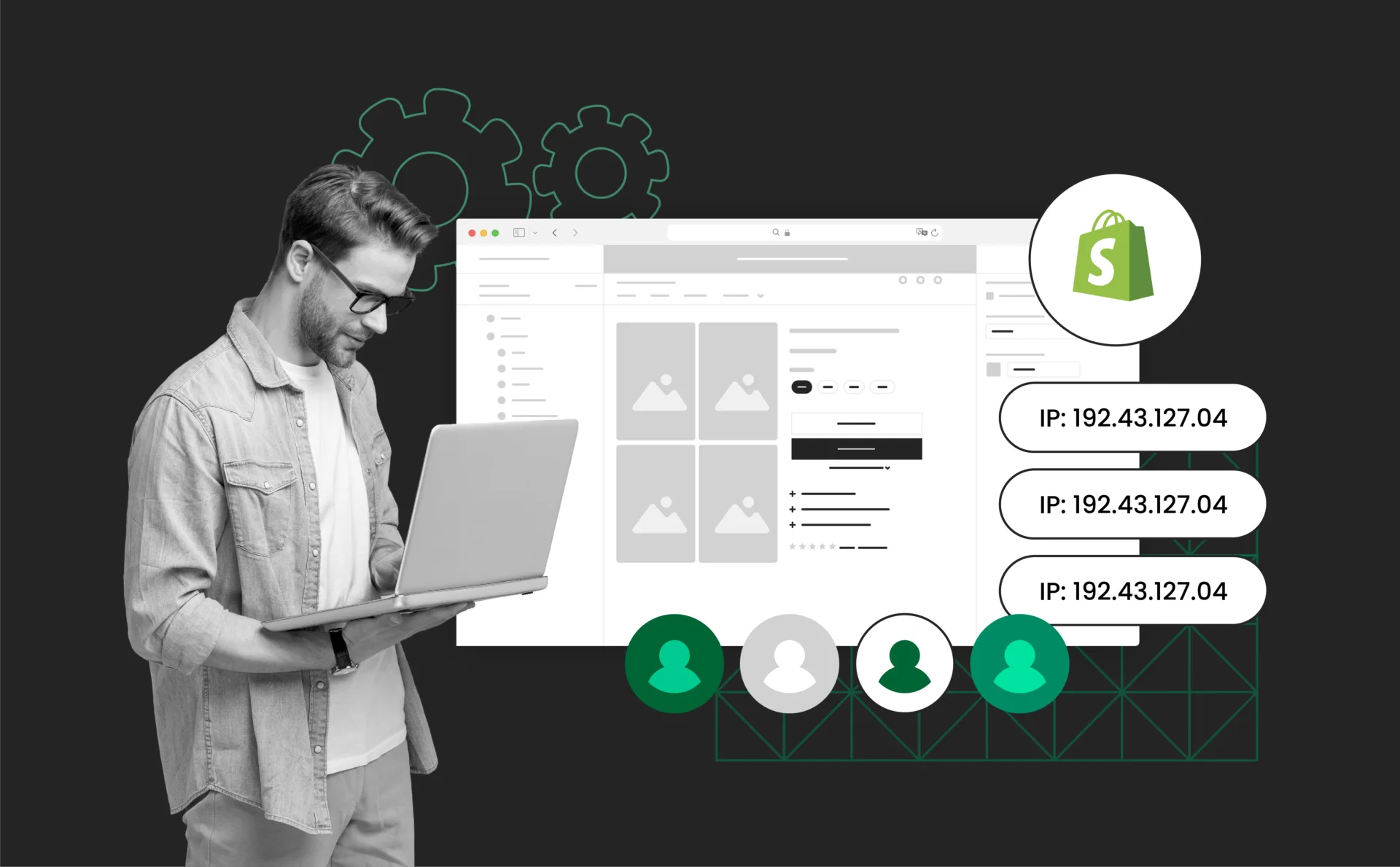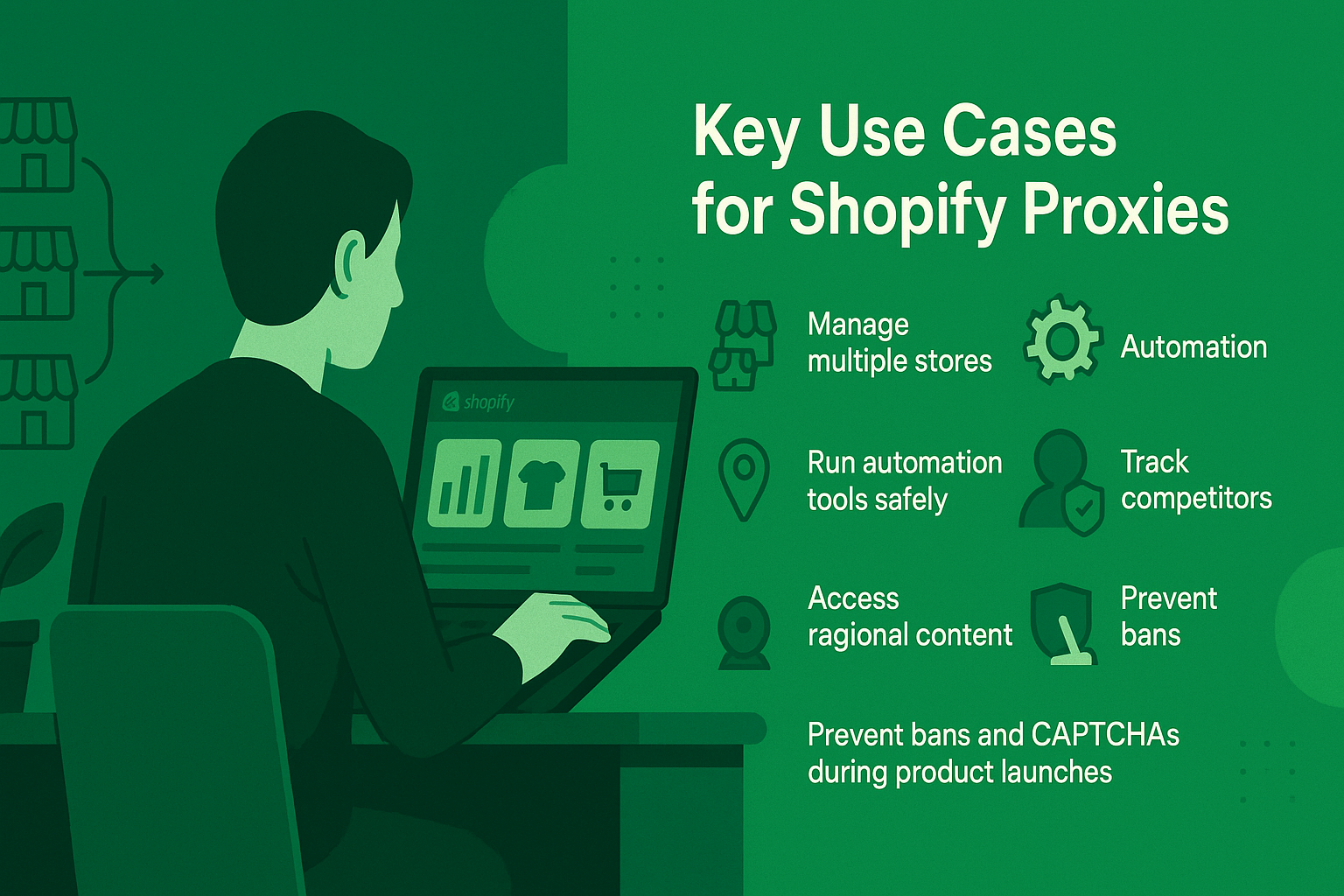
What is Shopify Proxy and How to Use it for Scraping, Monitoring, and Automation
Shopify doesn’t make it easy to scale. If you run multiple stores, collect product data, or use automation, you’ve probably hit blocks or got flagged. That’s because Shopify tracks your IP.
A Shopify proxy helps you get around that. It gives you fresh IPs so you can log in to different accounts, scrape competitor data, or run bots—without triggering Shopify’s limits. You stay hidden, stable, and in control.
This guide explains what Shopify proxies do, how they work, and how to use them safely for scraping, monitoring, and automation.
What Is a Shopify Proxy?
A Shopify proxy lets you connect to Shopify using a different IP address. Instead of showing Shopify where you’re really coming from, it routes your traffic through another location. That way, you can manage multiple stores, scrape data, or run bots—without getting blocked.
Shopify doesn’t like seeing too much activity from the same IP. If you log into several accounts or send too many requests too fast, it may stop you, show a CAPTCHA, or freeze access.
Shopify proxies help avoid that. They use real IPs—like those from homes or phones—so your activity looks normal. You can rotate IPs, spread out your traffic, and work without interruptions. Regular proxies can’t always do that. Shopify catches on fast. That’s why dedicated Shopify proxies are the better choice.
Why Use a Proxy with Shopify?
Shopify is strict when it comes to traffic patterns. If you try to run multiple accounts, scrape data, or automate tasks from the same IP, you’ll hit walls fast.
Here’s what usually goes wrong without a proxy:
- IP blocks: Too many actions from one IP, and Shopify may block you completely.
- Account bans: Managing multiple stores from the same device/IP can look suspicious.
- Rate limits: Shopify might slow you down or stop requests if you send too many in a short time.
A proxy helps you avoid all of that. It gives you a different IP—sometimes rotating every few minutes—so you don’t look like a bot. You can assign one IP per store, automate tasks in bulk, and stay under the radar.
Key Use Cases for Shopify Proxies
Using a proxy with Shopify isn’t just for tech-savvy users or large enterprises—it’s a practical tool for anyone running multiple stores, automating tasks, or gathering data without hitting limits. Shopify’s security systems are designed to detect unusual patterns, like repeated logins from the same IP or high-frequency scraping. A Shopify proxy helps you avoid these triggers by rotating IPs and mimicking real user behavior.

- Manage multiple stores from one device without triggering Shopify’s duplicate account protections.
- Run automation tools safely for tasks like updating listings, prices, or inventory in bulk.
- Track competitor stores without getting blocked or showing your IP.
- Access regional content as if you’re browsing from different countries.
- Prevent bans and CAPTCHAs during product launches or traffic spikes.
- Protect your accounts by spreading activity across different IPs.
Types of Proxies for Shopify
Using a proxy for Shopify isn’t just about hiding your IP — it’s about choosing the right tool for the job. Some proxies are better for scraping, others for long-term store management. Here’s a plain breakdown of the main proxy types you’ll come across, what they’re good at, and when to avoid them.
Rotating Residential Proxies
These proxies use real home IPs that change frequently. They’re great for tasks that send a lot of requests, like scraping prices or viewing stores from different regions. Since they look like normal users, they’re less likely to get blocked. The downside? They’re slower and more expensive than datacenter options.
Static ISP Proxies
Also called static residential proxies, these use real IPs from internet providers but stay the same over time. They’re ideal if you need stability—like logging into multiple stores every day. Since they don’t change, they help build account trust, but they come with a higher price tag.
Mobile Proxies
Mobile proxies use real IPs from phones connected to 3G/4G/5G networks. They’re the hardest to block and are perfect for mobile testing or ad checking. If you’re running sensitive tasks that need top trust, this is your safest choice. Just keep in mind they’re slower and often pricey.
Datacenter Proxies
These are fast and cheap because they come from cloud servers. But they’re also easy for Shopify to detect. That means they’re not good for logins or anything high-risk. Still, they can be useful for speed-focused tasks or testing store performance without putting accounts at risk.
Shopify Proxy for Scraping: What Works and What Gets You Banned
Scraping Shopify might sound simple, but it’s anything but. The platform has strong security to stop bots. Too many requests from one IP, strange headers, or non-browser-like behavior will get you blocked fast.
Rotating residential or mobile proxies help spread requests across many IPs that look like real users. This keeps your scraping under the radar. Instead of one IP making 500 requests, it looks like 500 users each making one.
But IPs alone aren’t enough. Shopify tracks more than that. If you’re not using a headless browser like Puppeteer or Playwright — and masking fingerprints — you’ll still get blocked. That’s why many scrapers pair proxies with stealth plugins or anti-detect tools that mimic human behavior.
Shopify Proxy for Automation: Do’s and Don’ts
Automation can save time — from updating prices to managing orders. But without proxies, it also gets you flagged. Shopify will catch repetitive tasks from the same IP and limit or ban your account.
Proxies spread those actions across multiple IPs. That means you can safely run scripts, bots, or automation tools without tripping alerts.
Here’s the key: don’t overdo it. Rotate IPs at natural intervals. Don’t blast hundreds of tasks in seconds. Also, always pair your proxies with anti-detect browsers or headless tools to rotate user agents, cookies, and fingerprints. The more human your automation looks, the safer it is.
Legal and Ethical Considerations
Using a Shopify proxy isn’t illegal — but what you do with it matters.
Shopify doesn’t ban proxies outright. Many legit businesses use them to manage multiple stores, gather data, or test campaigns. What gets you banned is violating Shopify’s Terms of Service — like scraping personal data, bypassing rate limits, or using aggressive bots that disrupt services.
Here’s the rule of thumb: if you’re using proxies to work smarter within Shopify’s rules, you’re fine. But if you’re trying to trick the platform or spam it, you risk bans or legal trouble. Always review Shopify’s latest ToS and keep your automation respectful.
Best Tools to Use with Shopify Proxies
Using a proxy is just part of the setup. To make it work safely and at scale, you’ll need the right tools alongside it. These tools help you rotate IPs, manage browser fingerprints, and automate tasks without getting flagged.
Residential Proxy Providers
If you’re managing multiple stores, scraping, or automating actions, residential proxies are the safest option. They use IPs from real devices, which makes them hard for Shopify to detect. Some top providers, such as NodeMaven, offer large IP pools, session control, and high reliability. You get more stability and less risk of bans.
Anti-Detect Browsers
Shopify doesn’t just track IPs — it also looks at browser fingerprints. If your setup looks fake or reused, you’ll get blocked. That’s where anti-detect browsers like Multilogin come in. They let you create isolated browser profiles, each with its own IP, cookies, and device settings — perfect for managing multiple stores safely.
Puppeteer / Playwright + Proxy Scripts
If you’re building your own scraping or automation tools, Puppeteer and Playwright are solid frameworks. They let you control browser behavior through code and can easily integrate with proxy scripts. With the right setup, you can rotate IPs, mimic human clicks, and scrape or automate tasks while staying invisible to Shopify’s filters.
Best Practices for Using Shopify Proxies
If you’re using proxies with Shopify, how you set them up matters just as much as which ones you use. Shopify’s systems are quick to flag anything that looks automated, reused, or suspicious. To avoid bans and keep your operations stable, follow these best practices:
- Rotate IPs at natural intervals: Don’t switch too fast. Change IPs based on session length, not every second, just like a real user would.
- Use clean residential IPs: Choose residential proxies from trusted providers. These look like real users and are less likely to get flagged.
- Match browser fingerprint and device info: Use anti-detect browsers to align your IP, timezone, screen size, and other device details. Shopify checks all of it.
- Avoid reusing the same IPs across accounts: If you manage multiple stores, never connect them to the same IP. That’s one of the easiest ways to get banned.
FAQ about Shopify Proxy
Do I really need a proxy to run more than one Shopify store?
If you’re logging into multiple stores from the same device or IP, Shopify might think you’re up to something and flag your accounts. A proxy gives each store its own “identity,” so they don’t get linked.
What kind of proxy actually works for scraping Shopify?
Regular proxies usually get blocked. If you’re scraping, go with rotating residential proxies. They use real home IPs and switch often—makes your scraping look like normal browsing.
Can I get away with free proxies for Shopify?
You can try, but it’s risky. Free proxies are slow, shared, and often blacklisted. If you’re serious about not getting blocked, they’re not worth it.
What happens if I run a bunch of tasks from one IP during a big sale?
Shopify might block your IP or force a CAPTCHA. A proxy helps you spread out the traffic so it doesn’t all come from one place.
Are datacenter proxies okay to use with Shopify?
They’re fast, but easy to spot. If you’re just testing things, maybe. But for anything tied to real accounts, residential or mobile proxies are way safer.
Why does Shopify care about browser fingerprints?
Because IP isn’t the only thing they track. If your IP says you’re in Spain but your browser looks like it’s from the U.S., that’s a red flag. Using an anti-detect browser helps keep everything in sync.
Conclusion
If you’re serious about scraping, automation, or managing multiple Shopify stores, a proxy isn’t optional—it’s a must. Shopify’s filters are sharp. They’ll block anything that smells like automation or too much activity from one IP. A good Shopify proxy gives you the flexibility to move faster without getting flagged.
But not all proxies work. If you pick the wrong type or rotate too aggressively, you’ll get blocked anyway. Stick with residential or mobile IPs. Use an anti-detect browser. Rotate like a human would, not a bot.